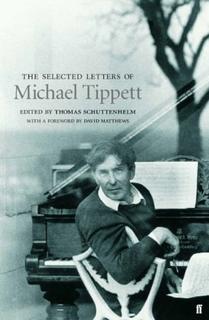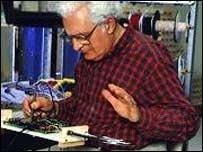 Although I haven't had a chance to see the book myself yet, composer Michael Berkeley has what looks to be a fair appraisal and overview in The Guardian of what one might well expect from the long-awaited The Selected Letters of Michael Tippett, edited by Thomas Schuttenhelm and with a foreword by scholar David Mathews (Faber, 2005).
Although I haven't had a chance to see the book myself yet, composer Michael Berkeley has what looks to be a fair appraisal and overview in The Guardian of what one might well expect from the long-awaited The Selected Letters of Michael Tippett, edited by Thomas Schuttenhelm and with a foreword by scholar David Mathews (Faber, 2005).Berkley writes of one excerpt that it is "quintessential Michael Tippett as I remember him, articulating a profound thought but then, as though intellectually dyslexic, digging himself into an ever deeper and more impenetrable grave as he allowed his tongue and mind to wander over disparate ideas. You began in the Home Counties and within seconds appeared to be surveying a lunar landscape. Recording an interview with Tippett was an absolute nightmare because, for all his charm, he was almost impossible to edit. Seemingly unconnected ideas joined seamlessly together to defy even the sharpest razor blade."
Well indeed. Though that word "seemingly" is an important qualifier. Tippett was rather less articulate, but just as mercurial, when his pen was crafting words as he was when they were forming musical notation. But it is important not to be deceived by the apparently chaotic assemblage in either form. There is often profound communication going on, and in the case of the music, very elaborate structure .
This, of course, is Tippett's centenary year. Regrettably, because of other commitments, I've got to precious few performances so far. I hope to rectify that before 2005 is out. For it is terribly sad that this great and quixotic composer (and man) should have seemingly fallen out of critical favour so soon after his death in 1998, and it is to be hoped that the current attention augurs well for his future recognition.
Meanwhile, Ashgate Publishing are offering £35 off the £50 cover price of the collection Michael Tippett: Music and Literature, featuring Edward Venn, Arnold Whitall, Suzanne Cole and others. And although Amazon lists the Selected Letters as out on 15 September 2005, you can order a copy, for £23 (£2 off the r.r.p.) with free UK postage and packing, by going to guardian.co.uk/bookshop or calling the Guardian book service on 0870 836 0875.
Some related recent articles from The Guardian are as follows
09.01.2005: Feature: Reaching the Tippett point
03.05.2005: Review: The Knot Garden, Linbury Studio, London
02.03.2005: Review: LSO/Davis, Barbican, London
01.03.2005: Review: Tippett Weekend, Bridgewater Hall, Manchester
06.01.2005: Review: Tippett at 100, Wigmore Hall, London
18.12.2004: Feature: Michael Berkeley pays tribute to Michael Tippett
In passing, I note with sadness the last public performance by The Lindsay Quartet, who championed Tippett's music (and his hero Beethoven's) alongside other considerable achievements.
Comment on this post: NewFrontEars


